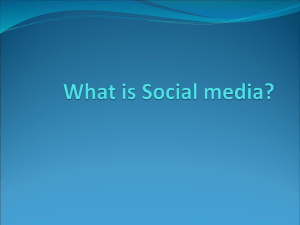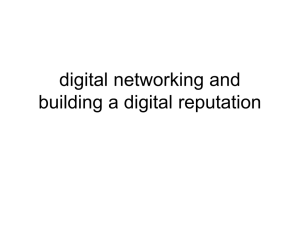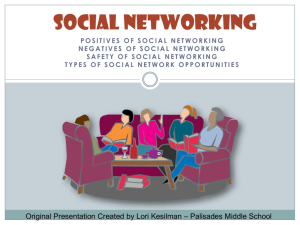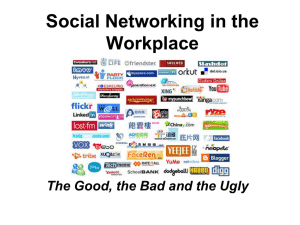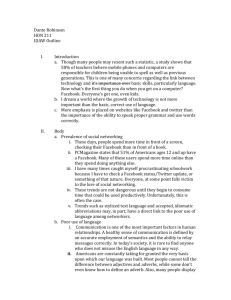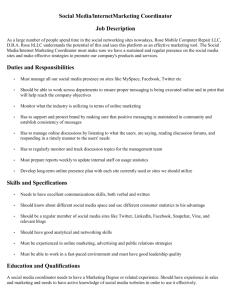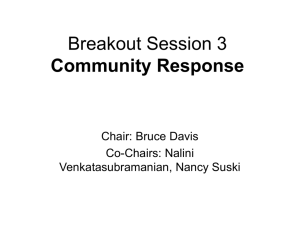Guidelines for Maintaining a Professional Compass in the Era of
advertisement
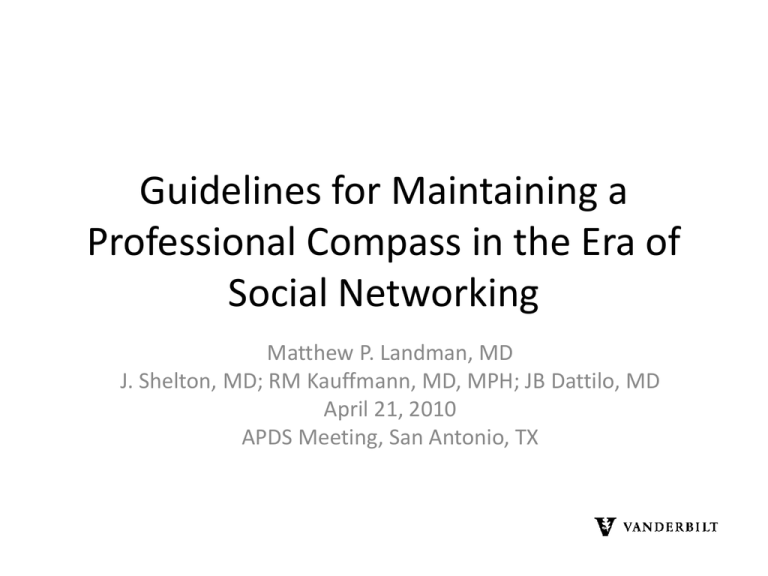
Guidelines for Maintaining a Professional Compass in the Era of Social Networking Matthew P. Landman, MD J. Shelton, MD; RM Kauffmann, MD, MPH; JB Dattilo, MD April 21, 2010 APDS Meeting, San Antonio, TX “Our profession, at its core, is fundamentally flawed relative to how today’s world communicates and functions. The infrastructure of health care needs a total repair from ground up. It needs to be Facebooked [and] wiki-ed” • Dr. Jay Parkinson MD (age 32) associate with Hello Health, a primary care medical practice in New York Social Networking 101 • Web 2.0 applications • Social networking sites – Ex: Facebook, MySpace, Twitter • “A social network service focuses on building and reflecting of social networks or social relations between people…who share interests and/or activities” Wikipedia • Personal web profile • Opportunity for Status updating, picture sharing, blogging – Online and/or mobile updating – Mobile phone – instant access Slide courtesy of Dr. Don Brady Use of Social Networking Sites Among US Adults 46% 8% Pew Internet and American Life Project, 2009 www.pewinternet.org Top 25 Social Networking Sites Ranked by Monthly Visits, Jan 2009 UV = unique visitors http://blog.compete.com/2009/02/09/facebook-myspace-twitter-social-network/ Vanderbilt University Top Visited Sites 2009 Rank Site # Hits 1 Facebook 439,510,400 2 Google 327,526,689 4 Yahoo! 69,665,489 6 MSN 55,910,311 7 Microsoft 51,663,087 8 YouTube 51,407,941 9 Apple 44,547,233 10 Go.com 38,077,420 16 Weather.com 18,299,872 17 NIH 17,690,563 22 Vanderblit.edu 5,788,180 Slide Courtesy of Dr. Donald Brady; Source: The Vanderbilt Hustler, Jan. 21, 2010 Imagine seeing this headline on your desk . . . Slide Courtesy of Dr. Donald Brady Comments Posted on Facebook in Response. . . • “Love a good BRAIN in the early morning!!” • “Do you feel like Hannibal Lector sometimes?” • “Should that be served with a white or a red wine????” • “MMM…I’m hungry now.” Publicly Accessible Facebook Postings by Vanderbilt Residents/Faculty • “just wired a neo-nazi’s mouth shut. And it was great.” • “______ has the OR all in a tizzy because I am operating on a dwarf. COOL!” • “if you are going to steal copper wire to support your drug habit, make sure the owner of said wire is not currently using it.” • “by the CT this patient should be dead, but, in fact, she is awake enough to call the police on me” The Vanderbilt Experience • Performed a Facebook search – Faculty in Section of Surgical Sciences – General Surgery Residents – Attempted to replicate what a patient/future employer might do and find if they performed a similar search • 127 faculty, 21% had a page • 88 residents, 64% had a page • Notably, only 50% of faculty & resident pages were private • 31% of public profiles had work-related status updates • 14% mentioned patient information (without names) Professionalism and Social Networking • Attributes of a profession – Monopoly over use of specialized knowledge – Relative autonomy in practice and the privilege of selfregulation – Altruistic service to individuals and society – Responsibility for maintaining and expanding professional knowledge and skills • ACS Code of Professional Conduct – Responsibility to patients and society Gruen et al. Professionalism in surgery. JACS, 2003 ACS Task Force on Professionalism. Code of professional conduct. JACS, 2004 Conclusions Guidelines are necessary when utilizing usergenerated web 2.0 applications such as Facebook Suggestions for Departmental Guidelines 1. Understand institutional policies 2. If an institutional policy does not exist, consider creating a departmental policy 3. Educate (repeatedly) residents and faculty 4. Consider the role (or possible role) social networking plays in HR issues Suggestions for Departmental Guidelines 1. Understand institutional policies 2. If an institutional policy does not exist, consider creating a departmental policy 3. Educate (repeatedly) residents and faculty 4. Consider the role (or possible role) social networking plays in HR issues 5. Appoint a departmental representative responsible for content and maintenance Personal Guidelines 1. Monitor your online reputation* 2. Understand privacy settings of sites you use 3. Remember your audience (intended and unintended) 4. Beware of the permanence of online content 5. Maintain professional boundaries *Gorrindo and Groves, JAMA 2008 "[The] precepts of professionalism extend beyond the operating room, the clinic, and the hospital, to your family, your peers, and other professional associates, your casual contacts, your community, and wherever you venture. You are specially acknowledged, privileged, and remunerated, but this must be constantly earned. This is the embodiment of the surgical profession, now and persisting on through this new millennium. Each generation has an obligation to our past, to the present, and to the future” LaMar McGinnis, Jr., MD, FACS Presidential Address to the ACS, 2009 Thank you

